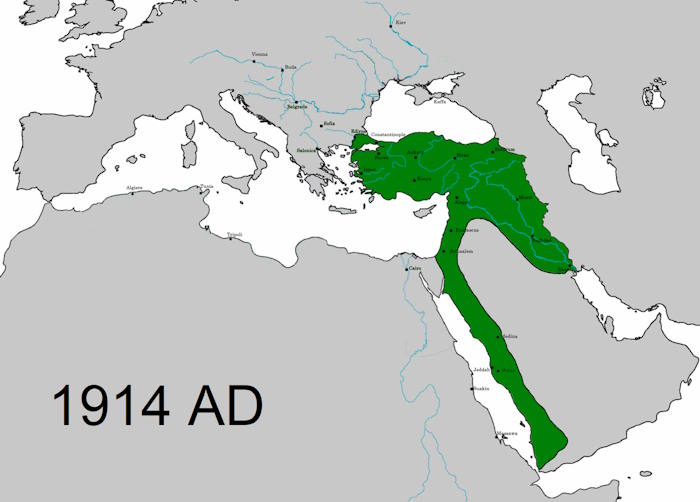The First World War was primarily sparked by the power struggle between England and Germany. The French wanted to reclaim the Alsace-Lorraine region from Germany. Nationalism was spreading across the globe. The Industrial Revolution led to a search for oil and raw materials. There were disputes between Russia and the Austro-Hungarian Empire, along with Russia’s ambitions to access the Mediterranean Sea. Austria-Hungary wanted to dominate the Balkans. There was a border dispute between Bulgaria and Greece. The United States aimed to surpass England as a world leader. The assassination in Sarajevo ignited the conflict that forced the Ottoman Empire into World War I. The war divided nations into the Allied Powers and the Central Powers.

Europe was like a powder keg in 1914. Archduke Franz Ferdinand of Austria-Hungary was assassinated by a Serbian in Sarajevo during an inspection. Serbia intended to punish the assassin, but Austria used this as a pretext for intervention.
Supported by Germany, Austria-Hungary bombarded Belgrade and invaded Serbia. The war had begun. Russia, a friend to Serbia, declared war on Austria. Germany invaded Belgium and France. Italy initially allied with Germany and Austria, but soon switched sides. Nations started to declare war on each other, forming alliances.
The Allied Powers included England, France, Italy (which switched sides from the Central Powers), Russia, Serbia, Romania, Greece, Japan, Brazil, and the United States. The Central Powers consisted of Germany, Austria-Hungary, Bulgaria, and the Ottoman Empire. Italy switched sides, finding it more suitable to ally with the strengthening English forces in the Mediterranean. The English and French promised Izmir and Western Anatolia to Italy to gain their support.
On October 29, 1914, the Ottoman fleet, including German ships, bombarded Russian ports, triggering war declarations from Russia and Britain against the Ottoman Empire. The Ottomans, led by figures like Enver Pasha, aimed to leverage their strategic position and Pan-Turkic aspirations to become a significant power in the conflict. By November 14, 1914, the Ottoman Empire declared a Holy War, seeking to rally Muslim support globally. This marked the official and full entry of the Ottomans into World War I, opening multiple fronts against the Allies, from the Caucasus to the Middle East, in a complex and multifaceted theatre of war.
Reasons for the Ottoman Empire siding with Germany
The Ottoman leadership, especially Enver Pasha, admired Germany and believed in its victory. German ships attacked Russian ports, and the Ottoman Empire wanted to reclaim lost territories. There was a willingness to end capitulations and counter England, France, and Russia’s provocations among Ottoman minorities. The Ottoman Empire, weakened by the Balkan Wars, was initially outside the conflict. The seizure of ordered battleships by England, despite payment, angered the Ottoman Empire. Germany valued the Ottoman Empire’s central geographical position and sought to dominate Muslims by approaching the Ottoman Sultan, the Caliph of Islam.
The Most Important Ottoman Fronts During World War I
Gallipoli Front (February 1915 – January 1916)
Allies aimed to capture Istanbul and force the Ottomans out of the war, aiding Russia against Bolsheviks. This front was the only decisive Ottoman victory during World War I. Both land and sea battles stopped the English and French from passing through the straits, extending the war by about 2.5 years. Without aid, the Tsar fell, and Russia exited the war. Mustafa Kemal’s name began to shine brightly during this battle, and he was constantly mentioned in foreign media as the Turks found their leader.
Syria-Palestine Front (January 1915 – October 1918)
Opened to disrupt English colonial connections. The Ottomans fought both the English and Arab forces attacking from behind. The English defeated the Ottomans at Gaza and captured Jerusalem, gaining control of the region. The Lightning Armies retreated first to Damascus, then to Adana.
Hejaz-Yemen Front (November 1914 – June 1916)
Opened to defend holy lands against English control. The Ottomans fought English and Arab forces but were unsuccessful.
Caucasus Front (October 1914 – October 1918)
Opened for an attack on Russia, aiming to unite with Turks under Russian control and relieve Germany in the west, and to protect Iranian oil fields from Russia. Turkish soldiers froze to death in Sarikamish, and the Russians invaded Eastern Anatolia. Under the Bolsheviks, Russia withdrew, and the Brest-Litovsk Treaty returned Kars, Ardahan, and Artvin to the Ottomans, providing morale despite heavy losses.
End of the First World War and the Results for the Ottoman Empire
World War I ended with the overwhelming victory of the Allied Powers. The Ottoman Empire, Austro-Hungarian Empire, German Empire, and Russian Romanov Dynasty dissolved. The world blamed Germany, Austria, and the Ottoman Empire for the war. Small states emerged in Europe, and empires fell, replaced by republics. The Ottoman Empire lost all territories except Anatolia. The Bolsheviks came to power in Russia. After the war, the Turks, led by Mustafa Kemal, established the Republic of Turkey.
Hire Turkish Tour Guide
Let’s talk history of war and peace of Turkish history. The First World War is the final chapter of the Ottoman history and the beginning of the modern Turkish Republic. Contact me to learn more on Ottoman history and to hire a professional tour guide in Turkey. See you soon, Hasan Gülday.